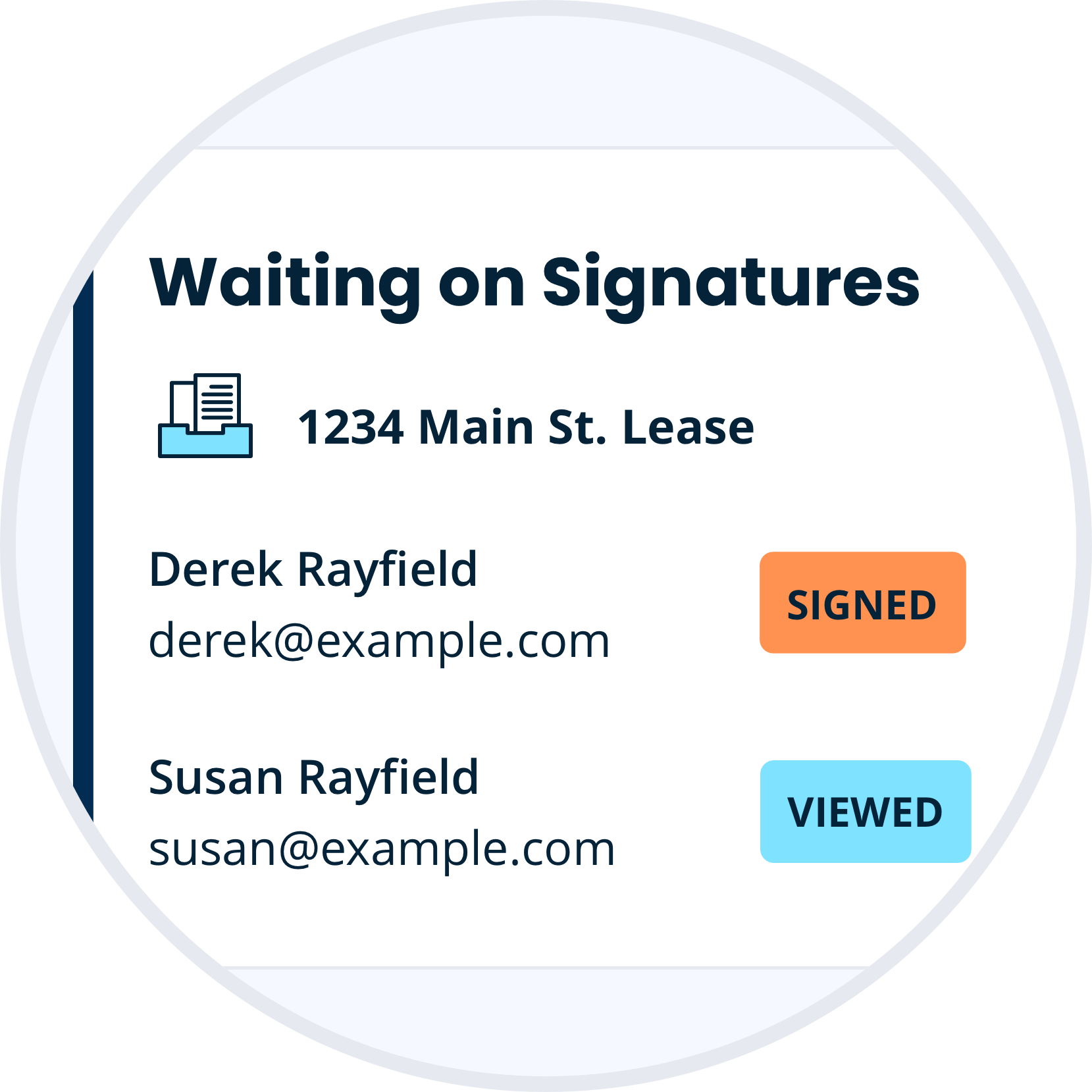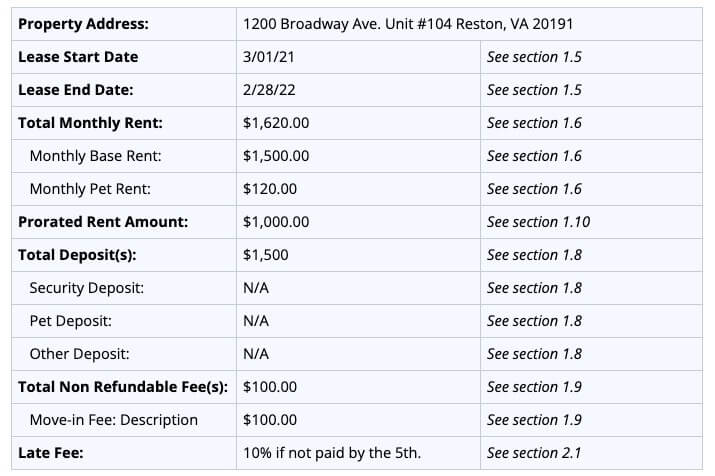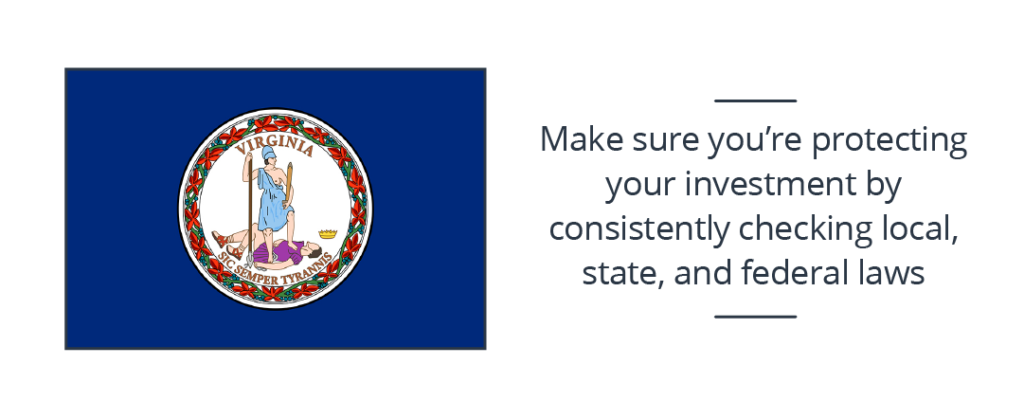Table of Contents
- Virginia Renters’ Rights and Landlord Responsibilities
- Virginia Landlords’ Rights and Tenant Responsibilities
- Criminal Background Check
- Application Fees
- Security Deposits
- Lease Disclosures
- Virginia Lease Agreement Sample
- Virginia Landlord-Tenant Law FAQ
- Due Diligence and Virginia Rental Laws
- Virginia Landlord-Tenant Law Resources
Related Laws
Virginia offers a thriving job market, four complete seasons, and a flourishing economy, which are all reasons why it is a great place to move or invest in rental property. As a landlord, Virginia is the perfect location to own a rental because of the transient population due to the capital being right down the road.
Laws that impact the rental market, landlords, and tenants are constantly being decided in states. Make sure you know what’s on your ballot – find Virginia voting information.

Virginia Renters’ Rights and Landlord Responsibilities
- Have 30 days to return security deposit
- No notice required before raising rent
- A 24-hour notice required before entering the property
- Required to make repairs within a reasonable time frame
When it comes to Virginia rental laws, there are a few specifics landlords need to know:
- Security Deposit – Virginia limits the amount a landlord may charge for the security deposit to no more than two months’ rent. Landlords must return the deposit within 30 days of the tenant moving out.
- Raising Rent – Landlords in Virginia may increase the rent to any amount for any reason with no notice.
- Notice of Entry – Virginia requires a 24-hour notice from the landlord before entering.
- Repairs – It is the landlord’s responsibility to keep the rental in safe and healthy living conditions. Landlords must make repairs within a reasonable time frame after being notified by the tenant. However, tenants may not take alternate action if the landlord fails to make repairs.
Virginia Landlords’ Rights and Tenant Responsibilities
- Tenants have five days to pay rent after they receive a notice
- Must give a three-month notice before terminating a lease
- Tenants must keep the unit in safe and habitable condition
- A tenant has 10 days to claim abandoned property
- Overdue Rent – If a tenant fails to pay rent on time, the landlord must give them a five-day notice to pay or quit. If the tenant fails to pay, the landlord may file for eviction.
- Terminating a Lease – If a tenant needs to terminate a month-to-month lease, they must give the landlord a three-month notice.
- Tenant Responsibilities – Tenants are required to keep the property clean and not disturb neighbors.
- Abandoned Property – If a tenant moves out and leaves personal property, the landlord must store the property for 10 days. After this time period, if the ex-tenant has not claimed it, the landlord may sell it or throw it away.
- Prepaid Rent – Any prepaid rent (not including security deposit) must be kept in an escrow account in a FDIC bank authorized to do business in Virginia. You must deposit it by the end of the 5th business day after you receive it, and it should remain in the account until the prepaid rent is due.
Criminal Background Check
- HUD (Federal) laws do not classify criminal backgrounds as a protected class, but making a decision to rent based off a criminal background alone could lead to a discrimination charge as it impacts certain protected groups of people disproportionately.
- However, if the criminal background check revealed a crime for the manufacture and distribution of drugs, homicide and/or stalking, denying the application is allowed.
- Landlords should have a consistent and equal policy or procedure in place to follow regarding criminal background checks so as not to discriminate against one class of people over another.
- HUD states that a landlord cannot ask about arrest records, only convictions, as innocent people are commonly arrested though the situation may not have resulted in a conviction.
- Some municipalities may have written their own laws expanding onto what you can and cannot ask regarding criminal backgrounds during the tenant screening process.
Application Fees
Virginia application fees are capped at $50.
If the applicant fails to rent the unit and the application fee exceeds $35, then landlord must refund the amount in excess of the actual expenses incurred within 20 days of rejection.
Security Deposits
You must return your tenant’s security deposit with 45 days of move out. Additionally, landlords must present a copy of the Virginia Landlord-Tenant Handbook to their tenants and have each party sign it.
Lease Disclosures
The following disclosures are required to be in Virginia lease agreements:
- Details regarding any shared utilities for the property
- Military Air Disclosure along with information on the noise zone or accident potential zone (both of which can be found on your locality’s official zoning map)
- Prior methamphetamine manufacturing on premises and clean-up efforts
- Knowledge of defective drywall* on the premises
- Knowledge of visible mold in interior of premises
Build a Virginia lease agreement with all of the required disclosures in less than 15 minutes.
*Drywall installed during 2001-2008 and exhibits strontium, sulfur, or hydrogen sulfur exceeding acceptable levels under the Consumer Products Safety Commission
Virginia Lease Agreement Sample
There are three sections to a residential lease agreement. The first section outlines the custom details of the contract, such as who’s involved and for what address. Here’s an example Virginia lease agreement listing details found in Section 1:
Virginia Landlord-Tenant Law FAQ
Below are answers to some of the most commonly-asked questions when it comes to landlord-tenant laws in Virginia:
Can You Withhold Rent in Virginia?
Renters are not able to withhold rent for any reason in Virginia.
How Long Does it Take to Evict a Tenant in Virginia?
Evicting a tenant in Virginia can take anywhere from 2 to 4 months depending on the reason for eviction.
Is Virginia a Landlord-Friendly State?
Virginia is somewhat of a landlord-friendly state because of the lack of rent control laws.
What is the Eviction Process in Virginia?
There are four reasons a landlord may file for eviction in Virginia. The four reasons include failure to pay rent, violation of the lease agreement, the end of the lease term, and illegal activity. Depending on the violation, the landlord must give the tenant notice and anywhere from 5 to 21 days to cure their violation.
If the tenant fails to cure or quit, then the landlord may file a complaint with the court, which costs $151. After the complaint is filed, it will be served to the tenant at least 10 days before the hearing.
The hearing must be scheduled no more than 30 days after the complaint was filed.
If the court rules in favor of the landlord, then a writ of eviction will be issued within ten days. The sheriff must then deliver it to the tenant within 15 to 30 days. Once received, the tenant will have 72 hours to move out.
How Much Notice Does a Landlord Have to Give a Tenant to Move Out in Virginia?
Landlords must give a 30-day notice before asking a tenant to vacate the property.
Due Diligence and Virginia Rental Laws
TurboTenant has utilized many municipal sources, along with official state statutes, in order to compile this information to the best of our ability. However, local laws are always in flux, and landlords and tenants alike should be sure to do their due diligence and consult legal help when it’s needed. We hope the following list can serve as a valuable resource and allow you to succeed as a landlord or tenant in Virginia. Be sure to take proper precautions when it comes to finding the top candidates for your unit by utilizing our online rental application and tenant screening services.
Disclaimer: TurboTenant, Inc does not provide legal advice. This material has been prepared for informational purposes only. All users are advised to check all applicable local, state, and federal laws, and consult legal counsel should questions arise.

Unlimited Everything.
Create a single Virginia lease agreement, or subscribe and receive unlimited lease agreements, landlord forms pack, and e-signs for a simple annual fee. Be confident with all the legal forms and tools you need as a professional landlord.
Discover Our Unlimited PlanVirginia Landlord-Tenant Law Resources
- Chapter 13. Landlord and Tenant – Code of Virginia
- Chapter 13.2. Virginia Residential Landlord and Tenant Act – Code of Virginia
- Chapter 13.3. Manufactured Home Lot Rental Act – Code of Virginia
- Virginia Landlord-Tenant Handbook
Virginia Fair Housing Resources
- Virginia Fair Housing Office – State of Virginia
- Chapter 5.1. Virginia Fair Housing Law – Code of Virginia
- Local Tenant Rights, Laws and Protections: Virginia – HUD
- HUD in Virginia
Other State Resources
Virginia Associations
Virginia City-Specific Housing Resources
Virginia Beach
Norfolk
- Landlord and Tenant Resources – City of Norfolk
- Fair Housing | City of Norfolk, Virginia – Official Website
- Hampton Roads REALTORS®
Chesapeake
- Landlord/Tenant Relations – City of Chesapeake
- Fair Housing – City of Chesapeake
- Hampton Roads REALTORS®
Richmond
Federal Fair Housing Resources







